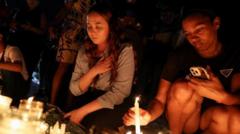In Allentown, Pennsylvania, Junior Clase's cluttered kitchen table serves as a poignant metaphor for his life as an immigrant in the U.S. The table is filled with personal items, including bottles he sends back to the Dominican Republic and a Bible, indicative of his deep connection to his roots while facing the challenges of life in a foreign land.
His journey took a harrowing turn when his wife, Solibel Olaverria, began experiencing severe headaches after joining him in the U.S. Only five months later, she was diagnosed with a brain aneurysm. After undergoing surgery that led to a stroke and a coma, their already precarious situation intensified.
In February 2023, hospital administrators proposed transferring Olaverria back to the Dominican Republic, an option Clase was vehemently against. He feared that, without a portion of her skull, traveling could be fatal. Faced with daunting realities, Clase's desperation illuminated a distressing trend in U.S. healthcare practices: the so-called 'medical deportation' which advocates describe as 'private deportation.'
This controversial practice of repatriating uninsured noncitizen patients to their home countries incites ethical and legal questions. Critics argue that such decisions often occur without full consent from patients, leaving them vulnerable and without options. Although regulations exist to ensure emergency care is given regardless of immigration status, changes to Medicaid and funding cuts threaten the access of immigrants to necessary healthcare.
The implications are severe. Immigrants are often left with limited healthcare options, forcing some to make heart-wrenching decisions about their care. Such circumstances led to widespread advocacy against medical deportation, illustrated poignantly through protests organized by the Free Migration Project on behalf of families like Clase's.
As the hospital came under public scrutiny, advocacy resulted in a Philadelphia ordinance aimed at preventing non-consensual medical repatriation, mandating hospitals to obtain patient consent and explore available state-funded programs that might assist uninsured individuals.
Through persistent community efforts, Clase was able to keep his wife in the U.S. as they jointly navigated the daunting healthcare landscape. Olaverria eventually awoke from her coma, yet much healing remains ahead. Together, they are applying for a visa that may allow them to remain longer in the U.S., while Clase dedicates his life to supporting and caring for his wife through ongoing challenges.
This case fundamentally illustrates the precarities faced by immigrant families, and the complexities of a health system that intersects with issues of immigration, finance, and care. The efforts of advocates shine a light on the ongoing need for policy reform and better support for vulnerable populations in the face of health crises.
His journey took a harrowing turn when his wife, Solibel Olaverria, began experiencing severe headaches after joining him in the U.S. Only five months later, she was diagnosed with a brain aneurysm. After undergoing surgery that led to a stroke and a coma, their already precarious situation intensified.
In February 2023, hospital administrators proposed transferring Olaverria back to the Dominican Republic, an option Clase was vehemently against. He feared that, without a portion of her skull, traveling could be fatal. Faced with daunting realities, Clase's desperation illuminated a distressing trend in U.S. healthcare practices: the so-called 'medical deportation' which advocates describe as 'private deportation.'
This controversial practice of repatriating uninsured noncitizen patients to their home countries incites ethical and legal questions. Critics argue that such decisions often occur without full consent from patients, leaving them vulnerable and without options. Although regulations exist to ensure emergency care is given regardless of immigration status, changes to Medicaid and funding cuts threaten the access of immigrants to necessary healthcare.
The implications are severe. Immigrants are often left with limited healthcare options, forcing some to make heart-wrenching decisions about their care. Such circumstances led to widespread advocacy against medical deportation, illustrated poignantly through protests organized by the Free Migration Project on behalf of families like Clase's.
As the hospital came under public scrutiny, advocacy resulted in a Philadelphia ordinance aimed at preventing non-consensual medical repatriation, mandating hospitals to obtain patient consent and explore available state-funded programs that might assist uninsured individuals.
Through persistent community efforts, Clase was able to keep his wife in the U.S. as they jointly navigated the daunting healthcare landscape. Olaverria eventually awoke from her coma, yet much healing remains ahead. Together, they are applying for a visa that may allow them to remain longer in the U.S., while Clase dedicates his life to supporting and caring for his wife through ongoing challenges.
This case fundamentally illustrates the precarities faced by immigrant families, and the complexities of a health system that intersects with issues of immigration, finance, and care. The efforts of advocates shine a light on the ongoing need for policy reform and better support for vulnerable populations in the face of health crises.


















